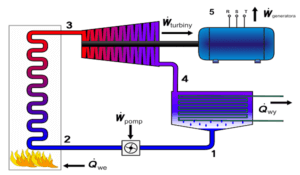Boiler Act, 1923
The Boilers Act (No. 5 of 1923) was notified on 4-12-1923. It came into force from 1-1-1924. It has 34 sections. It is amended by the Act No. 49 of 2007 which became effective by Notification dtd. 1342-2007
Section 2 of the Act defines as under
Boiler means a pressure vessel in which steam is generated for use external to itself by application of heat which is wholly or partly under pressure when steam is shut off but does not include a pressure vessel-
(i) With capacity <25 liters (such capacity being measured from the feed check valve to the main steam stop valve)
(ii) With <1 kg/cm2 design gauge pressure and working gauge pressure or
(iii) In which water is heated below 100 °C.
Boiler Component
means steam piping; feed piping, economizer, super heater, any mounting or other fitting and any other external or internal part of a boiler which is subject to pressure exceeding 1 kg! Cm2 gauge. Economizer means any part of a feed-pipe that is wholly or partially exposed to the action of flue gas for the purpose of recovery of waste heat. Super heater means any equipment which is partly or wholly exposed to flue gases for the pressure of raising the temperature of a steam beyond the saturation temperature at the pressure and includes a re-heater.

Steam Pipe: means any pipe through which stream passes if (i) The pressure at which steam passes through such pipe exceeds 3.5 kg/(cm2 above atmospheric pressure or (ii) Such pipe exceeds 254 mm in internal diameter and pressure > 1 kg/cm2 and includes, in either case any connected fitting of a steam pipe.
Accident as defined u/s 2(a) means explosion of boiler or boiler component which is calculated to weaken the strength or an uncontrolled release of water or steam there from, liable to cause death or injury to any person or damage to any property.
Sec. 18 requires report of accident and inquiry in case of fatal accident.
New definitions of Competent au authority, Competent person, Inspecting authority, Technical advisor and structural alteration, addition or renewal are added
Now not only boiler inspector, but competent person can also inspect and certify boiler and its components during manufacture, erection and use. Inspecting authority can do this job during manufacture.
Unregistered or uncertified boiler shall not be used save as otherwise provided in the Act. Prior sanction of the Chief Inspector is necessary before carrying out any structural alteration, addition or renewal in or to any boiler or steam pipe. Any accident to a boiler or steam pipe shall be reported to the Inspector within 24 hours. His report shall be in form E (Rule 48).
Section 27A provides to form a Central Boiler Board consisting of members, nominating by the Central Government the representatives from the Central Government, Bureau of Indian Standards, Boiler and boiler component manufacturers, Users and other interests. Section 28 provides power and matters of regulations by the Board Sec 28A and 29 are for the rule making power of Central and State Govt. respectively.
Central Boilers Board makes and notifies regulations consistent with this Act. The main duties of the Boiler Inspector are the inspection and examination of boilers and steam pipes in accordance with Chapter IX of the Regulations and Chapter IV and V of the Gujarat Boiler Rules 1966. Reduction of pressure can be suggested Sanction for repairs to boilers shall be obtained beforehand Provisional orders should be issued after hydraulic tests.
Penalties have been increased up to Rs. 1 lac or /and 2 years imprisonment 11/3 24 7 1 2 Gujarat Boiler Rules, 1966 1
Inspecting Authority means an authority recognized by the Board as competent to grant a certificate in Form II, IIA or IIB and specified in Appendix-C, which includes Chief Inspectors of boilers of various states of our country as well as foreign and many foreign companies.
Inspecting Officer means an officer appointed by the Inspecting authority or an officer acting on their behalf for the purposes of approval of drawings, stage wise inspection of manufacture, examination of repairs, signing and issue of certificates, material manufactured and boilers constructed
Thus the central boilers board and authorities and officers recognized by them provide the backbone of boilers safety and checking from design to operation, maintenance and repair stages.
Boilers are classified as under
| Class | Limits of Application
Minimum thickens | Minimum Thickness | Constant |
| I | No limit | 0.25 Inch | 32 |
| II | (a) WP<105 psi
(b) WP in psi X ID <5250 inches. | IF ID is up-to 36’’ 5/16 inch. | 27 |
| III | (a) WP<30 psi
(b) WP in psi x ID <3000 inches. | ID over 36’’ , 3/8 inch | 23 if stress relieved 21 if stress not relieved |
In no case, the thickness should be less than that mentioned in above table or the factor of safety less than 4.
Form – 6 is the certificate for use of a boiler (reg. 389) with conditions. Appendix-J gives a long list of stages for inspection and testing by the Inspecting Authority Appendix L provides for testing procedure for safety valve discharge efficiency.
Regulation 396 is regarding safety of persons inside boilers. Effective disconnection from steam or hot water, discharge arrangement for leakage, hand lamp of 24 volt with lamp guard, key less socket, insulated handle and extension cord of approved type are required. Power driven equipment should have effective earthling. Method of disconnection should be got approved from the C113.
Chapter-XIV (Reg. 618 to 622) was substituted with effect from 9-10-1993 and renamed as ‘Small Industrial Boilers’ (SIB).
Shell type SIB should have volumetric capacity 22.75 liters. but < 500 liters, pressure up to 7 kg/cm2 o coil type or water tube boiler with capacity <150 liters. Pressure < 12 kg/cm2.
Guidelines for registration operation and maintenance are given in Reg. 622 Relaxations are given.





